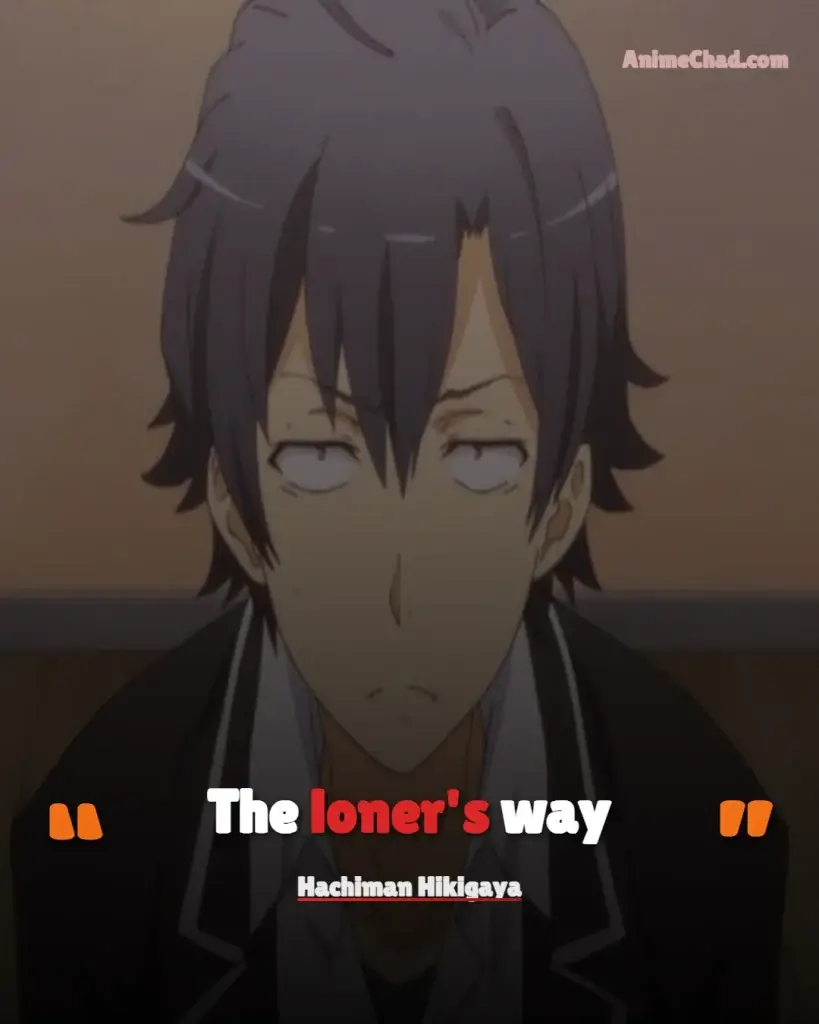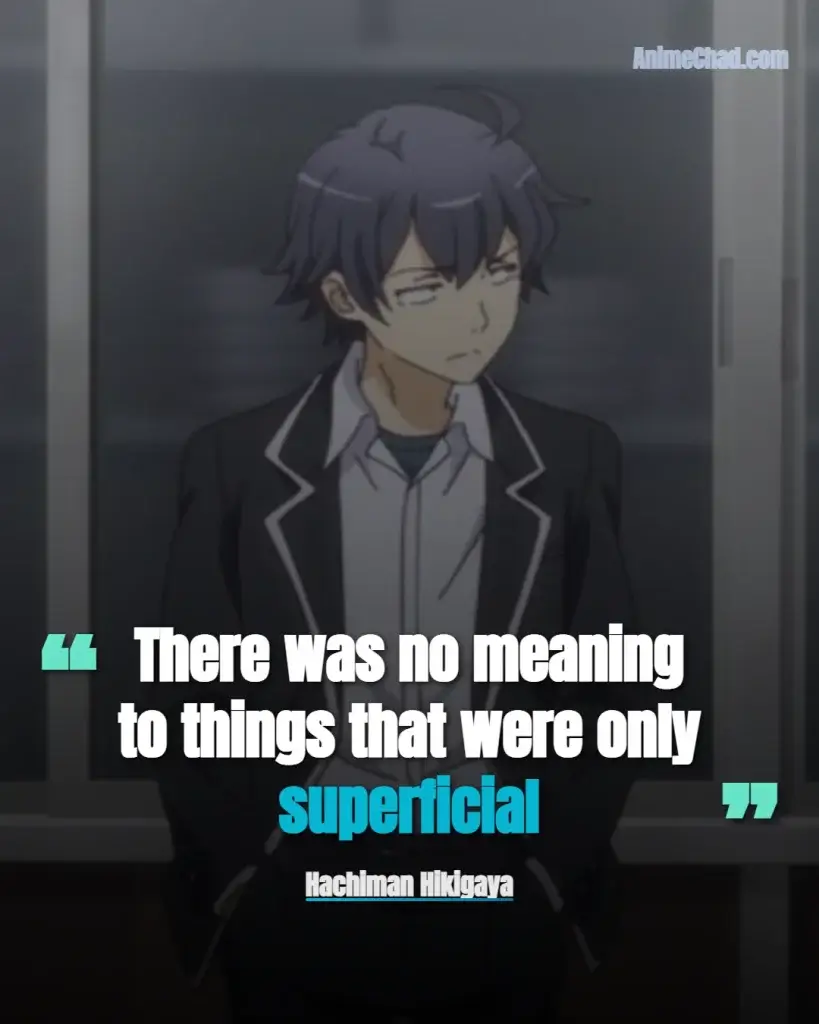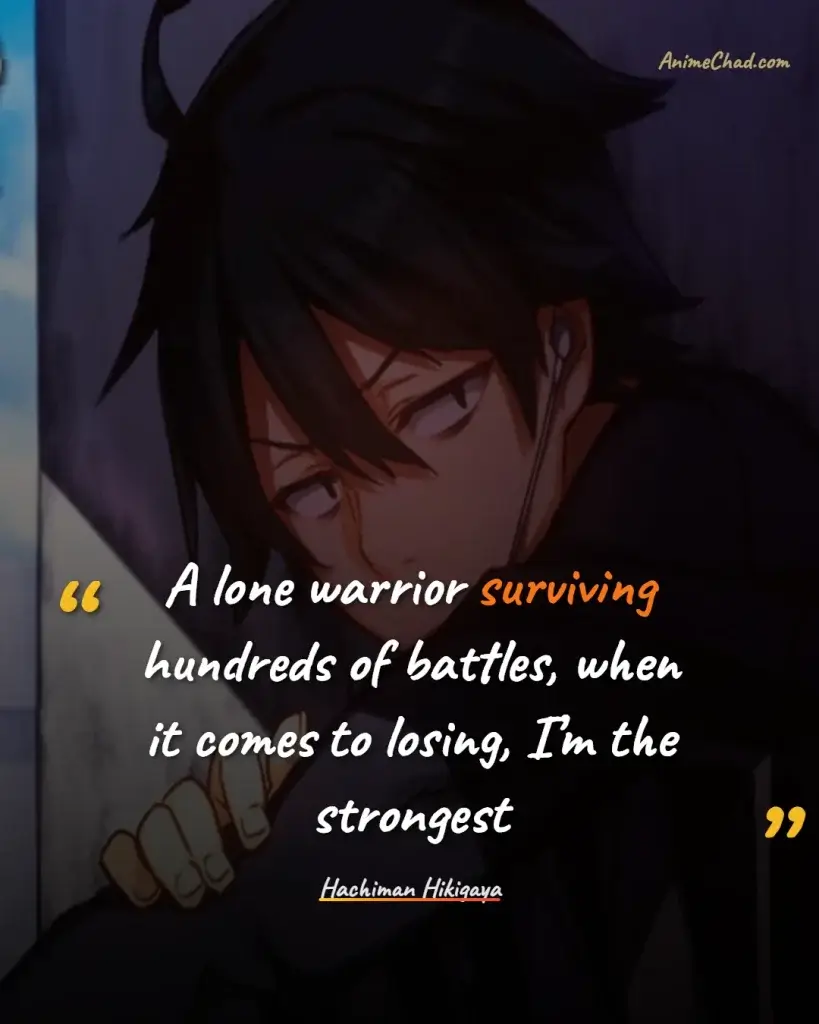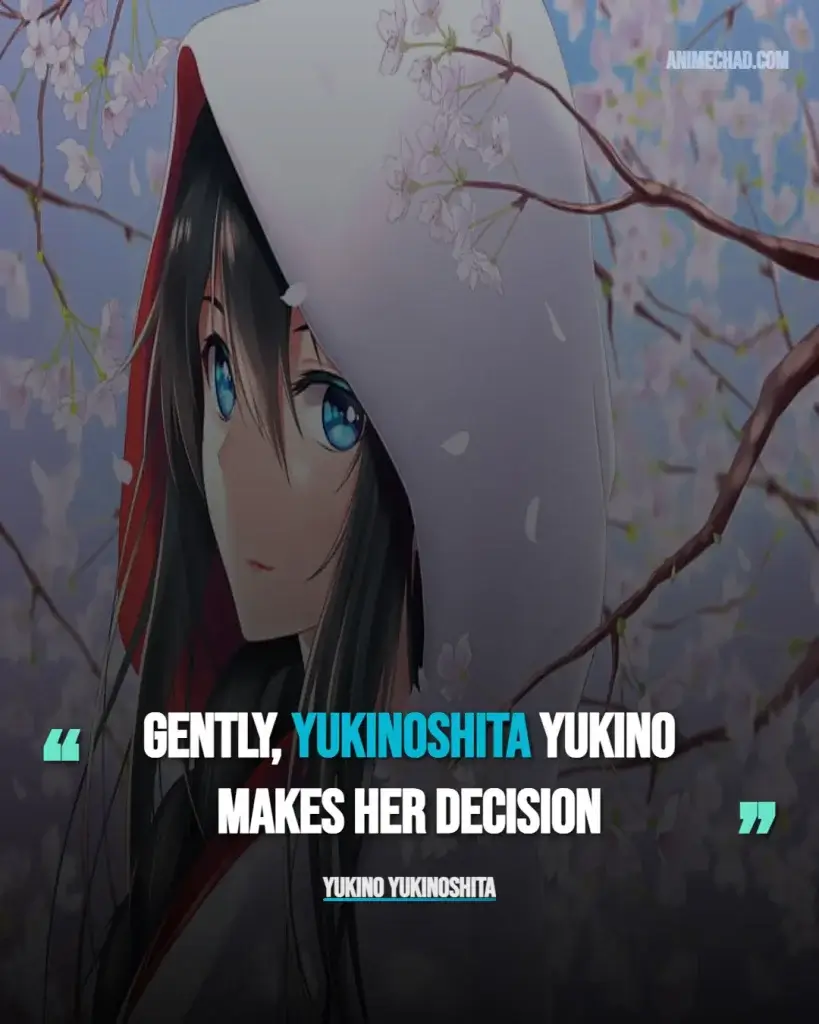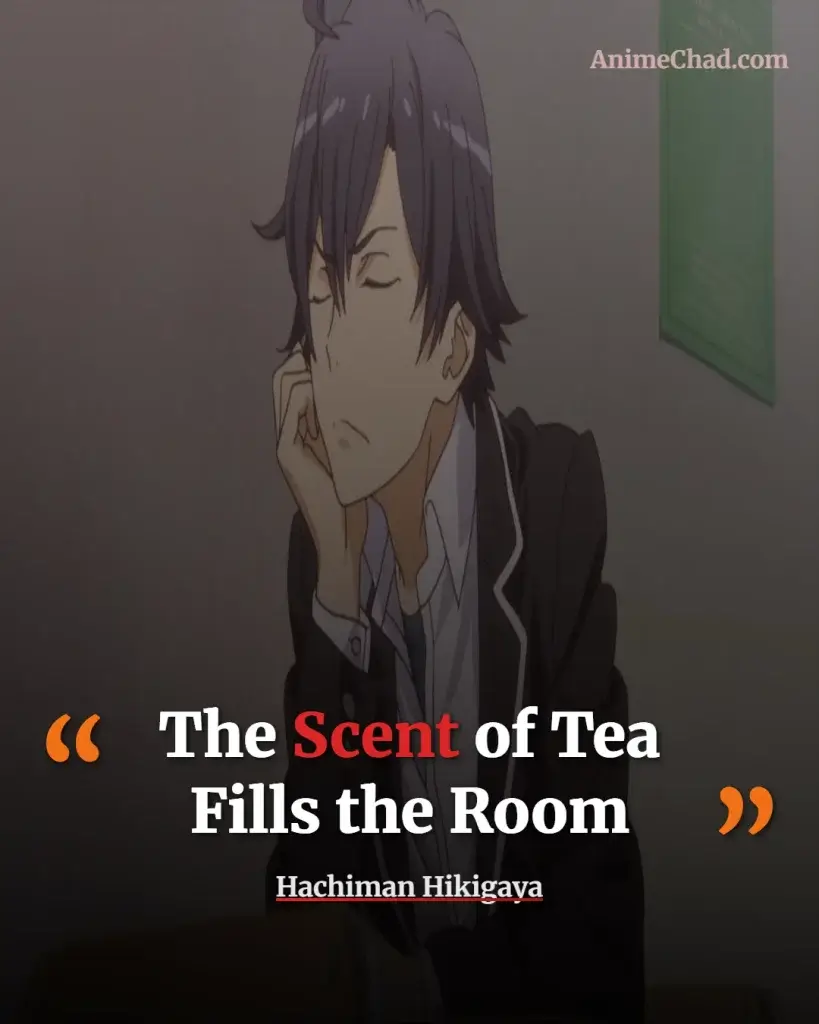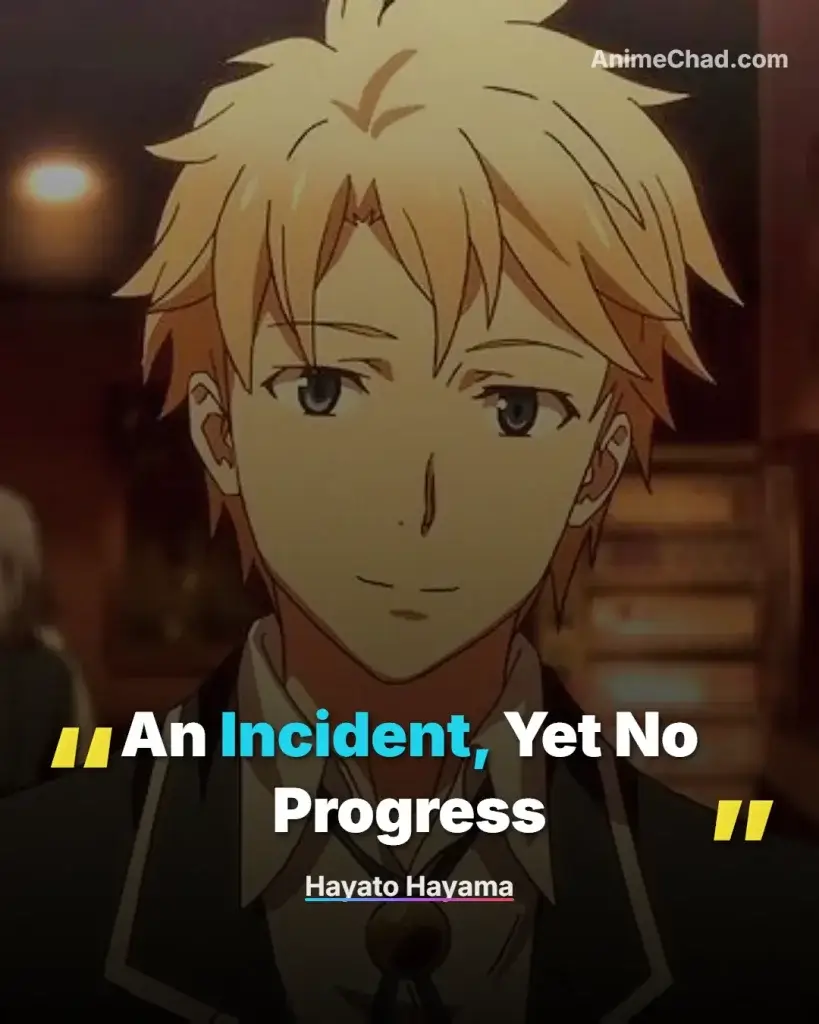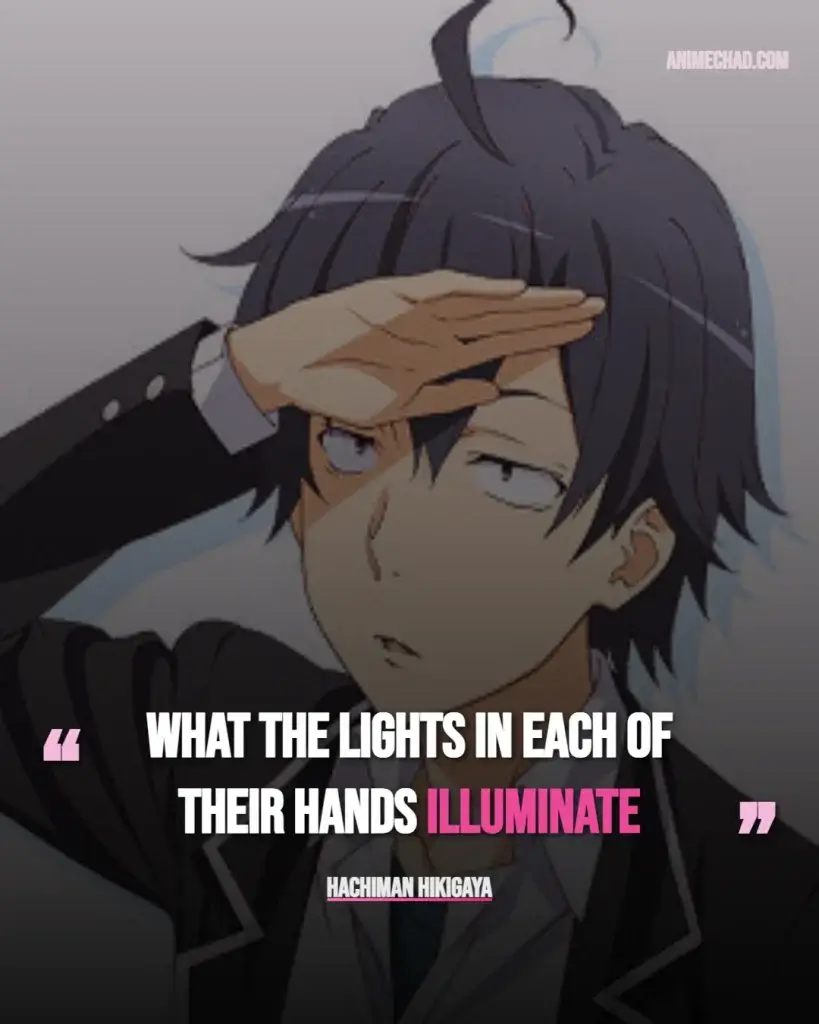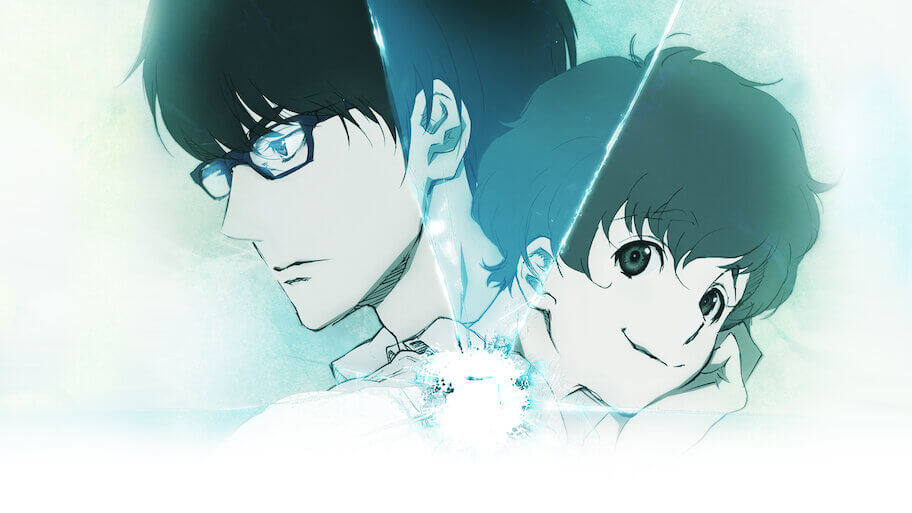My Youth Romantic Comedy Is Wrong, As I Expected
My Youth Romantic Comedy Is Wrong, As I Expected follows Hachiman Hikigaya, a cynical high school loner forced into the Service Club to solve schoolmates’ problems. The series delves into themes of genuine relationships, social facades, self-deception, and the pain of pursuing authenticity amid teenage isolation.
This curated collection of 29 quotes highlights pivotal moments across seasons, showcasing character growth, emotional depth, and the balance between introspective calm and relational conflicts.
Youth doesn’t last forever
Season 1, Episode 1 (Youth Romantic Comedy Is Wrong, As I Expected)
Hachiman Hikigaya
Opens Hachiman’s worldview, emphasizing fleeting adolescence and his rejection of superficial social norms, setting the tone for his quest against insincere connections.
I hate nice girls
Season 1, Episode 1 (Youth Romantic Comedy Is Wrong, As I Expected)
Hachiman Hikigaya
Hachiman’s disdain for performative kindness reveals his distrust of easy interactions, highlighting his early isolation and theme of lies in social bonds.
Reality is cruel, so lies are a form of kindness
Season 1, Episode 2 (If One Doesn’t Work, Try the Opposite)
Hachiman Hikigaya
Challenges Yukino’s ideals during their first clash, underscoring Hachiman’s defense mechanism of cynicism to cope with rejection and the series’ exploration of truth versus comfort.
You can’t be friends with someone you don’t understand
Season 1, Episode 3 (Sometimes the Gods of Rom-Coms Smile on You)
Hachiman Hikigaya
In reflecting on Yui’s approach, it marks Hachiman’s growing awareness of genuine bonds, tying into themes of empathy and his hesitant steps toward vulnerability.
My way of thinking and your way of thinking are both wrong
Season 1, Episode 4 (In Other Words, He Has Few Friends)
Yukino Yukinoshita
Yukino’s admission during a debate exposes her perfectionism’s flaws, fostering character development through mutual self-doubt and the theme of flawed perspectives.
The loner’s way
Season 1, Episode 5 (Once Again, My Youth Romantic Comedy Is Wrong)
Hachiman Hikigaya
Hachiman articulates his outsider philosophy while solving Saika’s issue, emphasizing self-reliance amid budding club dynamics and isolation’s emotional toll.
Not everyone is perfect
Season 1, Episode 6 (However, That Room Continues to Play Out the Endless Everyday)
Yukino Yukinoshita
Yukino shares her family pressures, building trust with Hachiman and advancing her arc from aloofness to openness, connecting to authenticity’s burdens.
Unsaid feelings
Season 1, Episode 7 (Yet, the Girl’s Feelings Are Unreachable)
Yukino Yukinoshita
Critiquing Yui’s conformity, it reveals Yukino’s insight into hidden emotions, deepening the trio’s bonds and theme of unspoken relational tensions.
The service club activity log
Season 1, Episode 8 (One Day, They Shall Recall the First Day They Met)
Hachiman Hikigaya
Narrating the club’s request-handling, it shows Hachiman’s analytical growth, blending peaceful reflection with emerging teamwork in social simulations.
There was no meaning to things that were only superficial
Season 1, Episode 9 (For the Third Time, My Youth Romantic Comedy Is Wrong)
Hachiman Hikigaya
Dismissing shallow school events, it reinforces Hachiman’s pursuit of depth, marking his development from passive cynicism to active critique.
That was a single belief that both me and her once shared
Season 1, Episode 10 (The Distance Between Them Remains Unchanged, As If It Were All Just a Dream)
Hachiman Hikigaya
Reflecting on shared ideals with Yukino post-festival, it highlights emotional intimacy’s fragility and the theme of diverging paths in youth.
It doesn’t matter if we’re wrong… because every time we go wrong, we’ll continue to look for the right answer
Season 1, Episode 11 (And So, Yukino Yukinoshita Is…)
Hachiman Hikigaya
Encouraging Yukino amid family strife, it signals his supportive evolution, tying perseverance to the series’ core of iterative self-improvement.
What the lights in each of their hands illuminate
Season 1, Episode 12 (Many Things, Once Lost, Are Never Regained)
Yukino Yukinoshita
During the Christmas event resolution, it evokes hope in fractured relationships, showcasing Yukino’s growth toward valuing collective light over isolation.
A lone warrior surviving hundreds of battles, when it comes to losing, I’m the strongest
Season 2, Episode 1 (Nobody Knows Why They Came to the Service Club)
Hachiman Hikigaya
Boastful yet vulnerable opener to the arc, it underscores Hachiman’s resilience in defeat, deepening his internal conflict with social facades.
His and her confessions won’t reach anyone
Season 2, Episode 2 (His and Her Confessions Won’t Reach Anyone)
Yui Yuigahama
Yui’s hesitant admission of feelings exposes her fear of rejection, advancing her arc from bubbly facade to honest emotional risk-taking.
Gently, Yukinoshita Yukino Makes Her Decision
Season 2, Episode 3 (Quietly, Yukinoshita Yukino Makes Her Decision)
Yukino Yukinoshita
Asserting independence from family, it marks Yukino’s bold step toward autonomy, connecting to themes of breaking free from expectations.
Yuigahama Yui Makes Her Decision
Season 2, Episode 4 (Yuigahama Yui Makes Her Decision)
Yui Yuigahama
Choosing authenticity over popularity, Yui’s resolve highlights her development from people-pleaser to self-aware friend, amid relational strain.
The Scent of Tea Fills the Room
Season 2, Episode 5 (The Scent of Tea Doesn’t Fill the Room Anymore)
Hachiman Hikigaya
Noting the club’s emotional rift, it captures the quiet pain of unspoken tensions, emphasizing themes of loss in evolving dynamics.
An Incident, Yet No Progress
Season 2, Episode 6 (Without Incident, the Congress Doesn’t Progress)
Hayato Hayama
Hayama’s mediation attempt reveals his burdened role, adding depth to group conflicts and the emotional weight of unspoken leadership.
That Continues to Portray Endless Everyday Scene
Season 2, Episode 7 (That Room Continues to Portray the Endless Everyday Scene)
Shizuka Hiratsuka
Hiratsuka urges genuine struggle, pivotal for Hachiman’s realization of care’s pain, fostering his growth beyond self-sacrifice.
You don’t want to hurt them because you care about them
Season 2, Episode 8 (Hikigaya Hachiman Is…)
Shizuka Hiratsuka
Confronting Hachiman’s isolation, it forces emotional reckoning, highlighting development through vulnerability and bonds’ inevitable hurt..
And So, Yukinoshita Yukino…
Season 2, Episode 9 (And So, Yukinoshita Yukino…)
Yukino Yukinoshita
Yukino confronts her dependencies, a turning point in her arc toward self-reliance, tying to the theme of authentic independence.
What the lights in each of their hands illuminate
Season 2, Episode 10 (What the Lights in Each of Their Hands Illuminate)
Hachiman Hikigaya
During the genuine request speech, it demands real connections, marking Hachiman’s climax of growth from cynic to seeker of truth.
The answer seeks out of the real he keeps going
Season 2, Episode 12 (The Thing That the Light in Each of Their Hands Illuminates)
Hachiman Hikigaya
Reflecting on the prom’s fallout, it embodies perseverance in authenticity, balancing conflict with hope for resolution.
Always comes life but underneath pile of snow
Season 2, Episode 13 (Life Always Bursts Forth from Underneath the Pile of Snow)
Yui Yuigahama
Yui’s plea for the trio’s future underscores her emotional maturity, connecting peaceful renewal to the series’ redemptive themes.
If the truth is cruel, then lies must be kind
Season 3, Episode 1 (The Distance Between Them Is Increasing)
Hachiman Hikigaya
Revisiting core philosophy post-break, it highlights ongoing self-deception struggles, deepening Hachiman’s introspective arc.
A bird taking flight fouls not the water
Season 3, Episode 3 (A Bird Taking Flight Fouls Not the Water)
Isshiki Iroha
Iroha’s graceful exit from duties shows her subtle growth under Hachiman’s influence, emphasizing clean transitions in relational peace.
It’s now or never. Think, writhe, struggle, and agonize
Season 3, Episode 5 (The Scent That Fills the Room Is Definitely Not Tea)
Shizuka Hiratsuka
Pushing Hachiman toward genuine feelings, it catalyzes his romantic development, linking anxiety to the emotional stakes of authenticity.
If you don’t end things properly, it’ll fester
Season 3, Episode 10 (Spring Always Bursts Forth from Underneath the Pile of Snow)
Haruno Yukinoshita
Haruno’s warning on unresolved emotions exposes family cycles, aiding Yukino’s liberation and the theme of breaking deceptive patterns.






